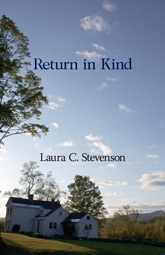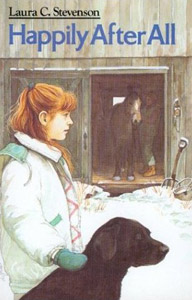A New Series: One Minute Reviews of
Books by Vermont Authors
Laura's column "One Minute Reviews" has appeared bi-weekly in Wilmington, Vermont's Deerfield Valley News since 2015. In April 2018, she found that no Vermont periodical consistently reviews all commercially published fiction and non-fiction by Vermont authors, so she started a series to fill that void. Published reviews from that series and some earlier reviews of local authors are listed with links to a scan of the printed copy. Reviews still in queue are listed without links until they appear in print.
The books reviewed in this series are available through Wilmington's Pettee Memorial Library, the Whitingham Free Public Library, and locally owned Bartleby's Books in Wilmington.
Deerfield Valley News, 9/19/2019
Reflections of a Ghost Writer
Howard Norman, The Ghost Clause. Houghton Mifflin Harcourt, 2019
A "ghost clause" is a stipulation in a real estate contract that obligates the sellers of a house to repurchase it if they know it contains a malevolent spirit but have not revealed its existence to the buyers. The ghost that narrates Howard Norman's novel is not in the least malevolent, though his presence sometimes sets off the security alarm in the house he haunts. His name is Simon Inescort, and he is a novelist who has died of a heart attack at the age of forty-eight on his way to giving a reading in Nova Scotia. The house his spirit still inhabits is the 1840's Vermont farmhouse which he shared with his artist wife, Lorca, for most of their seventeen-year marriage, and which she has recently sold to a newly married young couple, Muriel Strueth and Zachary Anders. As the book starts, Muriel has just successfully defended her doctoral dissertation and Zachary, a private detective, has been working for four months on the case of Corinne Moore, and eleven-year-old local child obsessed with the lives and classifications of moths.
Simon has to search for a word to describe his physical being ("what am I to call myself now, a revenant? An apparition? An entity?"), but intellectually, he is still a novelist. As he watches Muriel and Zachary's lives—what they eat, what they write, how they communicate—he keeps his carefully-written observations in leather-bound notebooks that he hides under the floor of what until recently was his writing cabin, fifty yards from the house. He justifies his voyeurism by saying that the couple may someday find these notebooks and "know something of who they were and are," but in fact, his descriptions read like material gathered for a novel, complete with reflections on the nuances of his descriptions of the couples' love life. He is constantly honing his technique, and while he clearly cannot publish his work, he writes for readers. Us, in other words. The infinite regression of our reading a novel about a novelist composing a novel, along with the play on the term "ghost writer," is so much fun that readers are only too willing to ignore (even miss entirely) Norman's delicate sleight of hand in the moving ending.
The book balances its forward-moving descriptions of the stresses upon Muriel and Zachary's marriage with Simon's backward-looking reflections on his own marriage. The principal stress he and Lorca endured was their inability to have a child, but there were also others, which Simon now regrets. Their childlessness is paralleled by the drawn-out hopes of the missing Corinne's parents (and thus of Zachary's frustrating search for the girl) and the birth and gradual growing up of Zachary and Muriel's little girl, who becomes attached to Lorca in a way Simon cannot share. Given its intellectual play, its sensitive portrayals of the effects of child-wanting on a marriage, its discussions of Zachary's professional difficulties, and its long passages about Muriel's academic friends and her translations of a Japanese poet, it is not surprising that the book proceeds slowly. But Norman, such a well-known novelist that one occasionally wonders about Simon's genesis, is extremely skillful at dealing with the variety of his characters and the northern Vermont village in which they live. Behind its meta-fictional fun is a perceptive reflection on art, literature, and marriage itself that lingers in the mind long after the book is closed.


